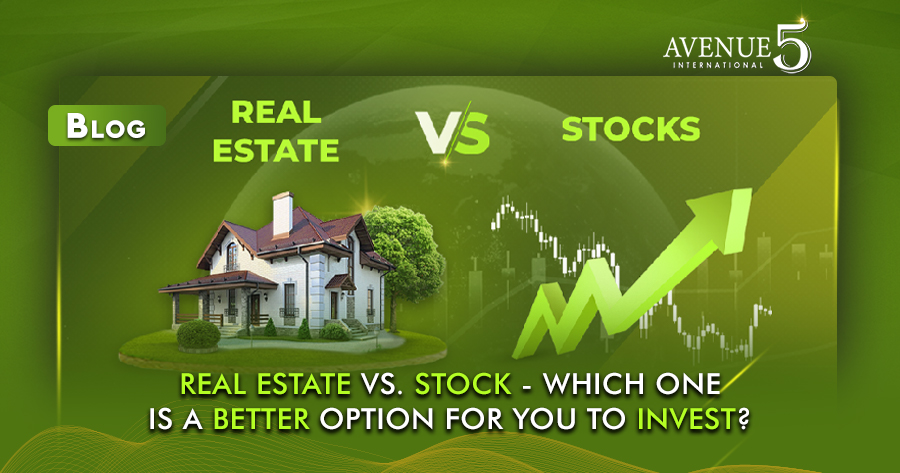
In recent years, there has been much debate over which investment is better – real estate investment or investment in the stock market. While both options have pros and cons, it ultimately comes down to what the investor is looking for. Real estate investment may be the better option for those who want stability and the potential for long-term growth. However, investment in the stock market may be the way for those willing to take more risks in hopes of a higher return.
Your financial situation, risk tolerance, investing goals, and style all play a role in your decision to invest in stocks or real estate. Since stock purchases don’t require as much time or money, there are more investors in the stock market. You’ll need to save some money if you’re buying real estate.
A tiny portion of the corporation is what you purchase when you buy stocks. Dividends and value growth, which occur when the company’s stock price increases, are generally the two methods to profit from stocks.
Real estate investments lead to the acquisition of actual land or property. Most real estate investors profit by collecting rentals, which can generate a consistent source of income, and from appreciation as the value of the asset rises. In addition, since real estate investment may be leveraged, you can increase your holdings even if you cannot pay cash upfront.
Real estate investment is enticing to many potential investors because it is a controllable, physical asset with the added advantage of diversification. Investors in real estate become the owners of a physical asset for which they are responsible when they purchase a property.

Here are several pros and cons of real estate investment and investment in the stock market:
Pros and Cons of Real Estate Investment:
Real estate investors can increase the leverage of their capital and profit from significant tax advantages. Real estate investment may not be as liquid as an investment in the stock market, but its long-term cash flow offers the possibility of appreciation and passive income.
Despite this, it’s crucial to consider how much money is invested in real estate. If you are making only some cash purchases, you must be able to obtain financing and down payment.
You can’t count on selling your properties as quickly when you may need to because real estate isn’t as liquid. The expenses related to property management and the time commitment required for repairs and maintenance are additional drawbacks.
Pros of real estate investment:
Investing in real estate has several pros over other investment options. First, real estate investment provides the investor with a passive income stream. This means that the investor can earn money without actively working for it. Second, real estate investment offers significant tax advantages. The investor can deduct various expenses, including mortgage interest and property taxes, from their taxable income. Third, real estate is a good hedge against inflation. As prices rise, the property’s value increases as well, providing the owner with an excellent return on their investment. Finally, leverage is another crucial advantage of real estate investment. Investors could use leverage to purchase more property than they could if they only invested with cash.
Cons of real estate investment:
Real estate investment has several cons. One con of investing in real estate is that it can be more work than buying stocks. You have to be more hands-on with real estate, which means more time and effort. Another con is that real estate can be expensive and illiquid. High transaction costs can affect your profits, and appreciation is never guaranteed.
Pros and Cons of investment in the stock market:
Investment in the stock market is a tempting alternative for most investors because it does not require a significant initial input. Stocks, unlike real estate, are liquid and typically simple to buy and sell, allowing you to rely on them in times of need. It might be simple to create a well-diversified portfolio when there are so many equities and ETFs to pick from.
But as was already mentioned, equities tend to be more unpredictable, making them riskier investments, mainly if you panic sell. Your tax burden could significantly increase if you pay capital gains tax after selling your assets. Your holdings can only grow significantly if you have a lot of money in the market.
Pros of investment in the stock market:
Investing in stocks has many benefits that make it desirable for those looking to grow their wealth. Perhaps most importantly, stocks are highly liquid, meaning they can be easily bought and sold on the open market. This liquidity provides investors with the flexibility to respond to changes in the market quickly and without incurring hefty fees.
Stocks are also easy to diversify, meaning investors can spread their risk across several companies and industries. Finally, transaction costs associated with buying and selling stocks are typically meager, making it an affordable way to build an investment portfolio.
Cons of investment in the stock market:
Potential investors should be aware of a few potential drawbacks to investing in the stock market. One is that stocks tend to be more volatile than other investments like real estate, so you could see more significant swings in the value of your portfolio.
Another thing to remember is that selling stocks can trigger hefty taxes. If you’re in a high tax bracket and have held the stock for a long time, you could owe a significant chunk of your profits to the government.
Finally, some stocks simply move sideways for years, providing little price appreciation. While there are certainly some benefits to investing in the stock market, it’s essential to be aware of the potential downsides before putting any money into the market.
Final words:
To evaluate whether you should invest in real estate or stock or both, you should consider the factors of market volatility, cash flow, diversification, management and transaction costs, liquidity, tax effects, and your own time and effort. There are pros and cons for each of these factors for real estate investment and investment in the stock market. It ultimately comes down to your preference for risk, time horizon, and investment goals.
For more blogs stay tuned on Avenue5 International.
Visit BinTariq GOC if you want to know more about us, and Times Square & The Dunes Mall for our projects information.

